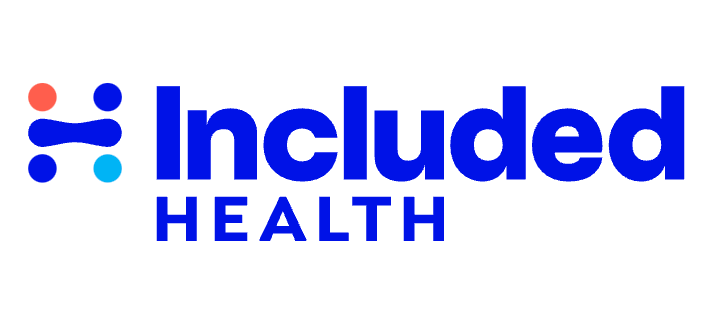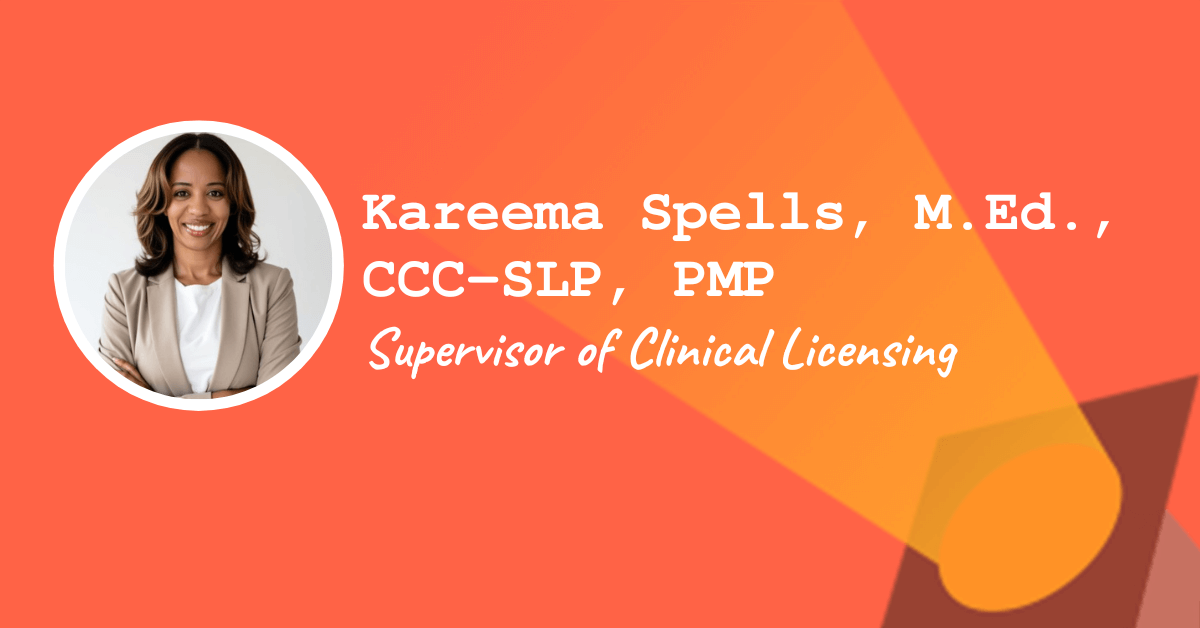This week’s spotlight is on Kareema Spells, M.Ed., CCC-SLP, PMP, a non-clinical speech-language pathologist who is now Supervisor of Clinical Licensing for Included Health!
This post may contain affiliate links or codes. This won’t increase your cost, but it helps keep TNCPT alive, and free of annoying ads! Thank you for your support. 🙂
What is your full name, title, and company name for your current, primary role?
Kareema Spells, M.Ed., CCC-SLP, PMP — Supervisor of Clinical Licensing for Included Health

What additional roles do you currently have?
PRN SLP for Empire Care Centers.
Where are you located?
Atlanta, Georgia.
Where did you go to SLP school, and what year did you graduate?
Georgia State University, 2008.
Please refrain from contacting our spotlight participants on social media. There are thousands of readers just like you out there. 🙂 Please ask your questions in the comments on this blog post.
If you’re a Non-Clinical 101 student, you can network with many of our spotlight participants in the alumni groups!
What did you do when you first finished school, and for how long?
I completed my CFY in skilled nursing/long-term care. I stayed in this setting for three years.
In what setting(s) did you work, and what types of patients did you treat?
I’ve had the opportunity to work across a wide range of SLP settings as I explored what felt like the right fit for me. Over the years, I spent five years in skilled nursing and long-term care, two years in the school system, one year in an outpatient pediatric clinic, and a brief summer stint in home health. I gained valuable insight into different patient populations and treatment approaches.
What did you enjoy about your early roles? What didn’t you enjoy?
Each of my earlier roles gave me a different lens into the field and helped shape my clinical mindset. Skilled nursing was particularly rewarding because it was my first opportunity to ground my clinical decision-making skills.
In the school system, I loved working with elementary-aged children, especially seeing their progress. But as someone who’s naturally more introverted, I found the need to be “on” all day to be emotionally draining.
Over time, I began to feel the effects of burnout. It stretched me beyond my limits and helped me prioritize working environments that aligned with my personal and professional development style.
What else have you done since then, prior to your current role?
In 2017, I transitioned into my first fully non-clinical role as IRF-PAI PPS Coordinator position for an inpatient rehab unit within a Level I trauma hospital. I held that role for four years. The role provided me with a better understanding of the backend of clinical therapy with a focus on healthcare documentation, Medicare/Medicaid reimbursement systems, insurance approvals/denials, and healthcare metrics.
In 2021, I shifted to my first fully remote position as a clinical account manager for a teletherapy company. I blended my clinical background with client relations and operational support. Shortly after, I accepted the role as Manager of Compliance for the East Coast for the same teletherapy company, where I managed a team of compliance specialists focused on multi-state licensing, internal audit readiness, and school district regulations.
When and why did you decide to do something non-clinical?
I started thinking about non-clinical options in graduate school. I had a business administration/finance degree from undergrad, and I always considered merging those two worlds in some capacity. I wasn’t sure what it would evolve to be, but I knew I wanted to explore the opportunities. Over time, I began to streamline my interests and focus on clinical operations processes.
What are you doing these days?
Currently, I manage a team of seven Licensing Specialists as Supervisor of Clinical Licensing.
Are you still treating patients, or are you solely non-clinical?
I still treat patients on a PRN basis on the weekends. I’m fortunate to set my own hours and availability with my SNF manager. It gives me an opportunity to keep my SLP skills fresh.
What percentage of your time is spent clinically vs. non-clinically?
My primary role as a Supervisor of Clinical Licensing is M-F and is strictly non-clinical.
How long have you been in your current role?
Since September 2023.
Did you get any special certifications or training along the way to help you get into your current role?
I didn’t complete any formal certifications or specialized training. I felt confident in the skills I acquired in compliance process oversight and as a previous people manager. I leveraged my business skills to sell myself and the value I could bring to the company.
How did you find your job? Did you apply or find it through a connection?
I found my current job and applied to their job posting on LinkedIn.
Did you do anything special to your resume and cover letter to land the job?
I tailored my clinical resume to highlight my soft skills—like communication, adaptability, and leadership—and emphasize measurable outcomes. I made sure to include key metrics, productivity benchmarks, and documented successes to give a well-rounded picture of my impact in each role.
What was the interview like for the supervisor of clinical licensing role?
The interview process for this role consisted of a 30-minute recruiting screen to assess my general fit for the job description, a 60-minute panel interview with my potential team to assess my management style, and 30-minute key stakeholder interview.
How have people reacted to you leaving patient care?
Early on, I’d find myself explaining to people who didn’t understand my career pivots that it was a natural progression of the skills I acquired. I think a lot of people are used to viewing careers as very linear. Stepping into a non-clinical role just puts me in a different position to support the same goal.
I’m still contributing to the patient experience and helping healthcare systems run more efficiently, which still makes a significant impact.
What’s a typical day or week in the life like for you? What types of tasks and responsibilities fill your time?
I manage a team of seven medical and behavioral health licensing specialists. My typical week involves team support via 1:1s and process oversight. I review their progress on getting our clinicians licensed across multiple states, celebrate successes big or small, and help them work through internal or external barriers.
I also track licensing efficiency across our various service lines and lead several weekly syncs to ensure alignment across departments. I manage our third-party licensing vendor operations to keep everything moving smoothly and address escalations as needed. My role keeps me connected to the operational and strategic sides of the business.
What are some of the rewards of your role? What are the biggest challenges?
I know the work my team and I do directly supports our clinicians serving the needs of our members. I manage a great group of experienced, knowledgeable, and insightful licensing specialists, which makes my role as their servant leader both positive and collaborative.
Even with a strong team, I still juggle the people management aspects of navigating different personalities, communication styles, and process preferences. One ongoing challenge is managing company expectations around licensing timelines and operational efficiency, and effectively communicating these results to key stakeholders. I do my best to balance advocating for my team while delivering on business goals with transparency, accountability, and data-driven communication.
How did your clinical background prepare you for this role? Which skills transferred?
I use my SLP skills in my current role every day. Because of my clinical background, I have expertise in tackling complex information as a subject matter expert and effectively tailoring the message to my audience.
As an SLP, it has shaped me as a people manager. My background helped build my emotional intelligence and adaptability.
Ready to launch your own non-clinical career?
What type of person do you think would do well in your supervisor of clinical licensing role?
To thrive in my current role, a person needs to be able to pivot. They need to be very detailed-oriented, knowledgeable, transparent, and solution-focused.
Do you work remotely or onsite?
I work remotely every day.
Did you read any books, take any courses, or do anything special overall to get you where you are today?
I’m a knowledge seeker, so I read/listen to any blogs, social media posts, LinkedIn articles about career shifts I come across online. I was a regular listener of the Switch, Pivot, or Quit podcast with Ahyiana Angel prior to my first non-clinical role.
What is a typical career path for someone in your role?
Most professionals start with roles like licensing analysis, credentialing, and compliance.
These roles help build foundational knowledge in state and federal licensing regulations, credentialing and accreditation standards, and health systems and provider requirements.
What is next for you? What are your high-level career aspirations?
Since obtaining my Project Management Professional (PMP) certification in 2024, my high-level career aspirations include operations consulting focused on process optimization, systems implementation, and compliance projects.
Do you have any special advice for others who want to follow in your footsteps?
Think BIG and keep your mind open! Stop pigeon-holing yourself into a narrow view of what the field is or could be.





